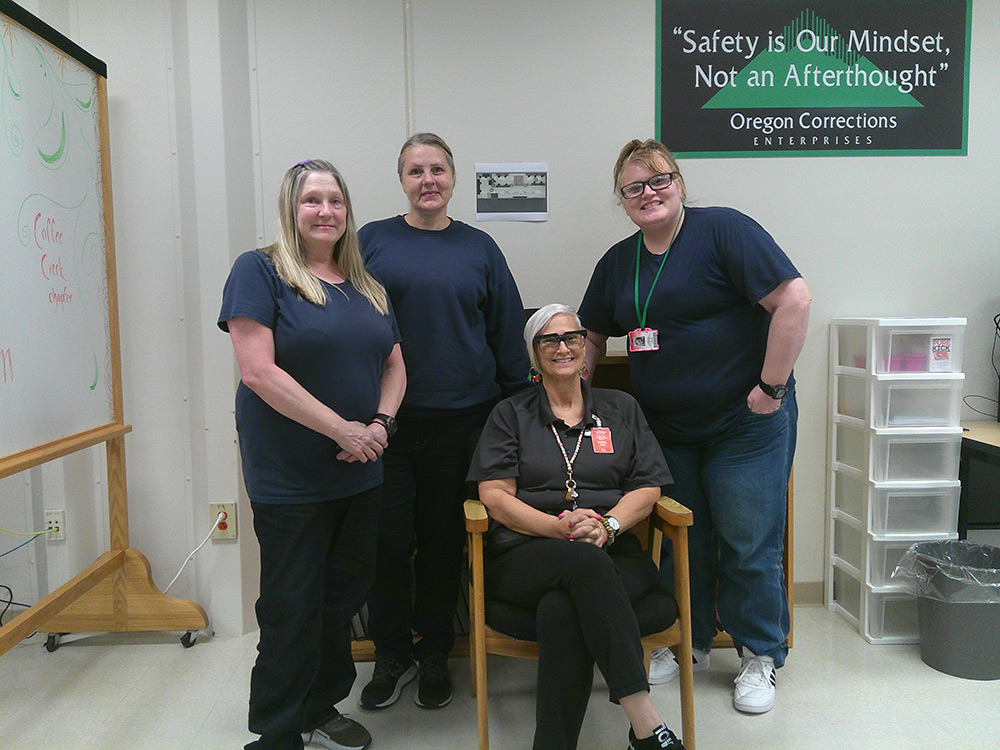
New Braille Program at Coffee Creek Correctional Facility Offers Purpose, Skills, and Second Chances
08/12/2025
Tags: Service
On July 21, 2025, Oregon Corrections Enterprises (OCE) in partnership with the Oregon Department of Corrections (ODOC) launched a groundbreaking Braille Transcription Program at Coffee Creek Correctional Facility (CCCF). The initiative equips incarcerated women with a highly specialized skill, promotes recovery and self-worth, and lays the foundation for sustainable futures—both inside and beyond prison walls.
At the center of this program is Deborah C. "Debbey" Adams — a Certified Braille Transcriber, Certified Peer Recovery Specialist, and Integrated Forensic Peer Recovery Specialist. Debbey is also formerly incarcerated, and her own journey from addiction and incarceration to professional success and national advocacy is the cornerstone of the program's mission.
Her introduction to braille came during her final incarceration in Virginia, where she trained in transcription through a prison program and earned her U.S. Library of Congress certification in 2010. After her release in 2014, she founded Dot Over DOT, LLC, providing accessible materials for blind and vision-impaired individuals nationwide. Now in Oregon, Debbey is teaching the very skill that transformed her own life.
Her remarkable reentry journey was featured by the Virginia Department of Corrections in a 2014 press release — a story that continues to inspire more than a decade later.
"Learning braille in prison gave me a future I never imagined for myself," she said. "It gave me dignity, a professional skill, and a way to give back to a community I had never even considered before — the blind and vision-impaired."
The First Cohort
The program's first group of participants includes three women in training, with a fourth joining soon.
Lynley admits she was unsure at first whether she made the right choice in applying.
“Well, I know with 100% certainty that I made the right choice. I'm excited to go to work each day and look forward to learning all I can… I feel like I found my place and I love being part of the first group in this amazing adventure."
Meredith, spent nine years as a janitor before applying to the program.
“For the first time, I felt hope… I CAN WRITE BRAILLE!!!! ME!!!!"
Susan says the team dynamic has been just as rewarding as the skill itself.
“We are already gel as a team while experiencing our individual victories… Today, I feel like 'my future's so bright, I've got to wear shades.'" The fourth participant, who will join this month, is living with Macular Degeneration Disease, a progressive eye condition. As her vision changes, she will transition from transcription to becoming a Certified Braille Proofreader, continuing to contribute in meaningful ways.
More Than a Skill
Debbey believes the program is about much more than learning braille.
“Coming back into a prison—not as a number, but as an educator and advocate—is the most meaningful work of my life… That trust is transformational. I know, because it changed me too."
The Braille Transcription Program at CCCF is more than vocational training. It's a bridge — connecting incarcerated women to a skill that provides value far beyond prison walls, fostering hope, purpose, and a sense of contribution that lasts a lifetime.
At the center of this program is Deborah C. "Debbey" Adams — a Certified Braille Transcriber, Certified Peer Recovery Specialist, and Integrated Forensic Peer Recovery Specialist. Debbey is also formerly incarcerated, and her own journey from addiction and incarceration to professional success and national advocacy is the cornerstone of the program's mission.
Her introduction to braille came during her final incarceration in Virginia, where she trained in transcription through a prison program and earned her U.S. Library of Congress certification in 2010. After her release in 2014, she founded Dot Over DOT, LLC, providing accessible materials for blind and vision-impaired individuals nationwide. Now in Oregon, Debbey is teaching the very skill that transformed her own life.
Her remarkable reentry journey was featured by the Virginia Department of Corrections in a 2014 press release — a story that continues to inspire more than a decade later.
"Learning braille in prison gave me a future I never imagined for myself," she said. "It gave me dignity, a professional skill, and a way to give back to a community I had never even considered before — the blind and vision-impaired."
The First Cohort
The program's first group of participants includes three women in training, with a fourth joining soon.
Lynley admits she was unsure at first whether she made the right choice in applying.
“Well, I know with 100% certainty that I made the right choice. I'm excited to go to work each day and look forward to learning all I can… I feel like I found my place and I love being part of the first group in this amazing adventure."
Meredith, spent nine years as a janitor before applying to the program.
“For the first time, I felt hope… I CAN WRITE BRAILLE!!!! ME!!!!"
Susan says the team dynamic has been just as rewarding as the skill itself.
“We are already gel as a team while experiencing our individual victories… Today, I feel like 'my future's so bright, I've got to wear shades.'" The fourth participant, who will join this month, is living with Macular Degeneration Disease, a progressive eye condition. As her vision changes, she will transition from transcription to becoming a Certified Braille Proofreader, continuing to contribute in meaningful ways.
More Than a Skill
Debbey believes the program is about much more than learning braille.
“Coming back into a prison—not as a number, but as an educator and advocate—is the most meaningful work of my life… That trust is transformational. I know, because it changed me too."
The Braille Transcription Program at CCCF is more than vocational training. It's a bridge — connecting incarcerated women to a skill that provides value far beyond prison walls, fostering hope, purpose, and a sense of contribution that lasts a lifetime.
Posts by Category
Monthly Archive
